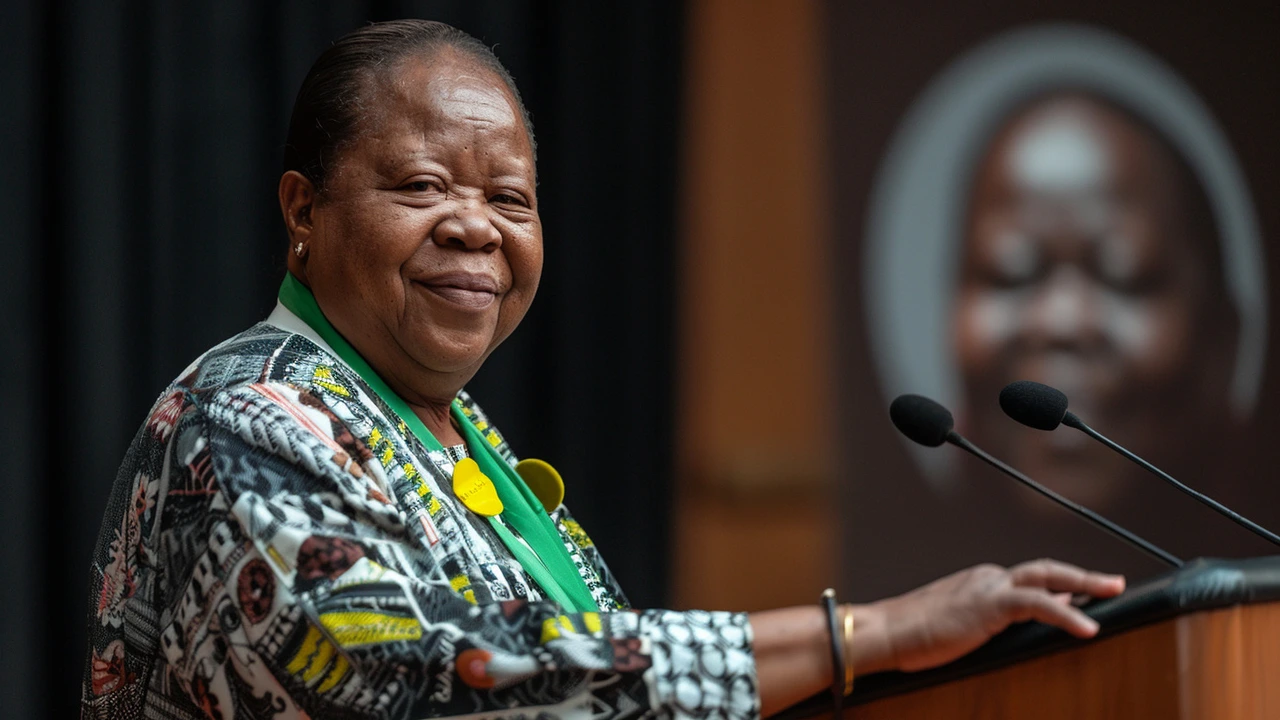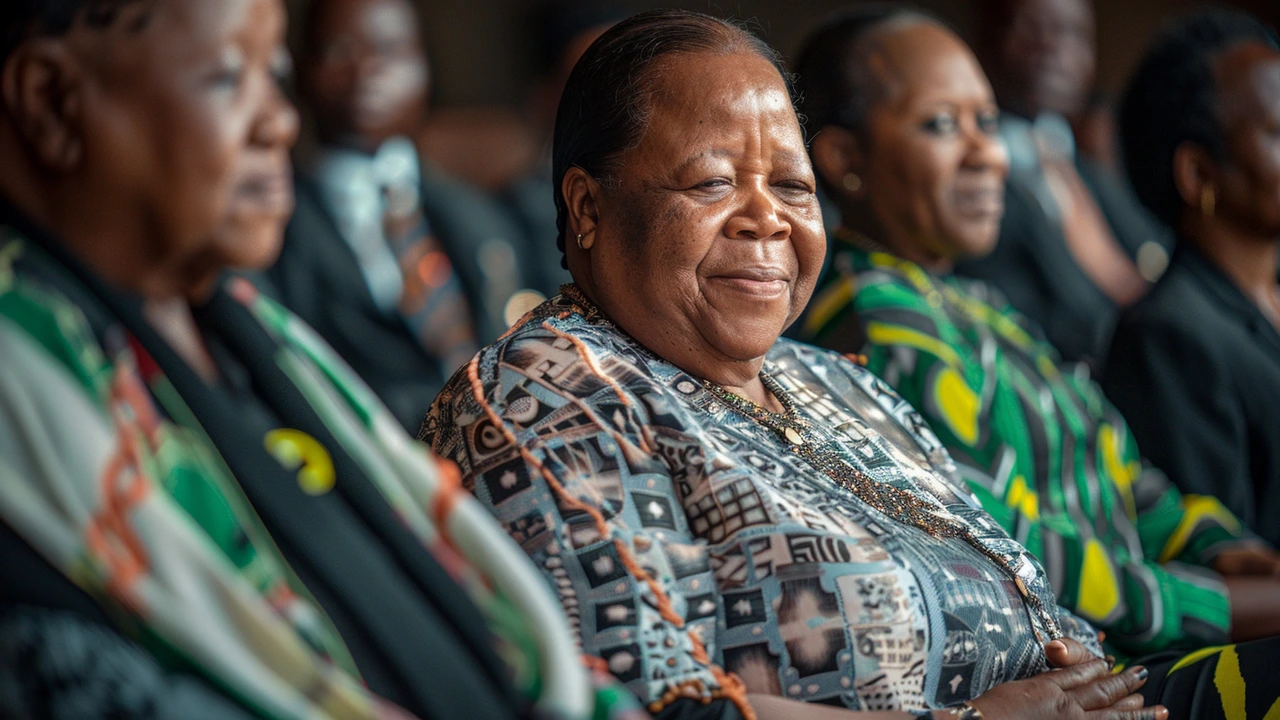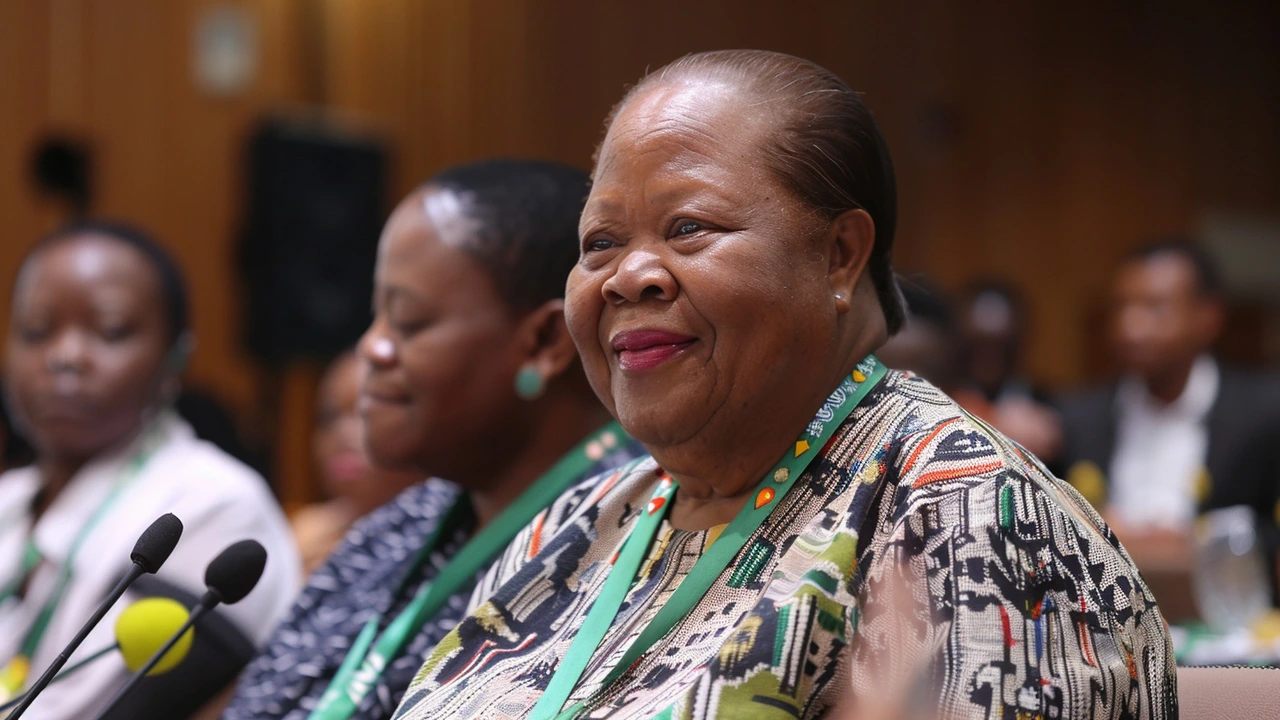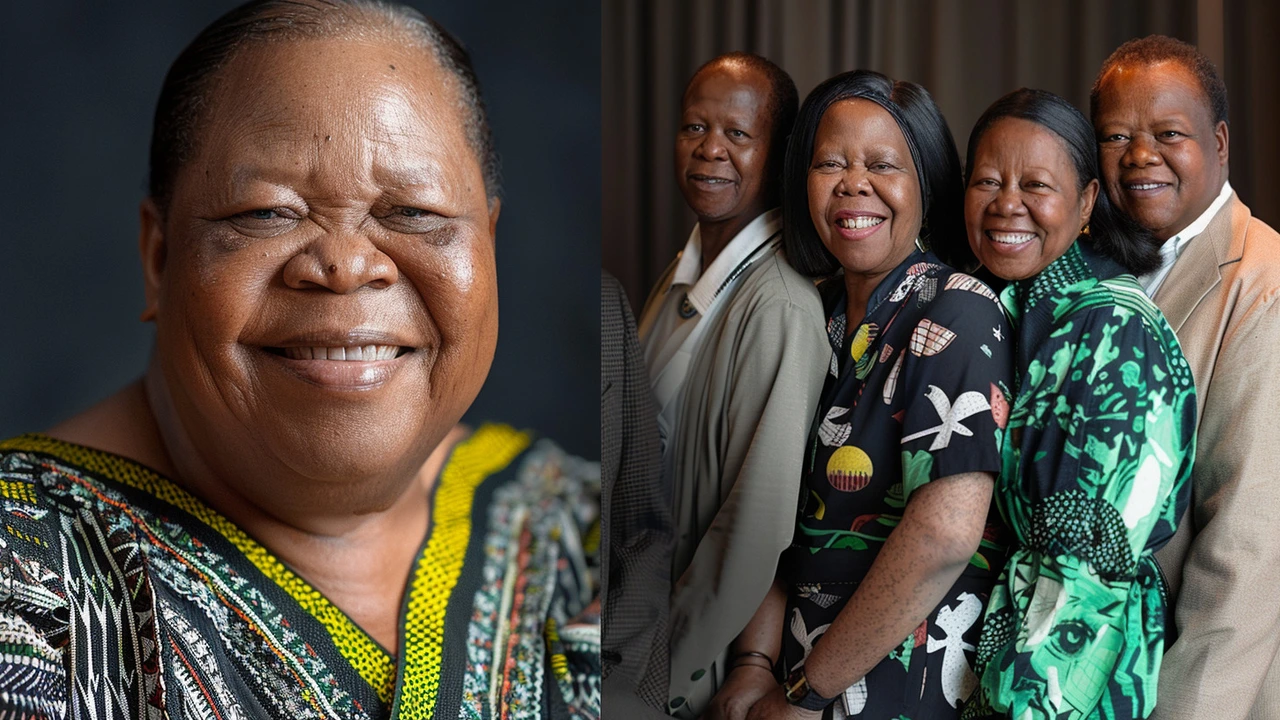Simphiwe Dana Backs Naledi Pandor for South Africa's First Female Presidency
 Jun, 6 2024
Jun, 6 2024
In a recent statement that has captured the public's attention, South African singer and songwriter Simphiwe Dana has lauded Naledi Pandor, the Minister of International Relations and Cooperation, as a potential candidate for the presidency. Dana's endorsement did not come lightly; it is rooted in years of observing Minister Pandor's impressive career and dedication to bettering South Africa's societal landscape, especially in terms of gender equality and international diplomacy.
Simphiwe Dana's Endorsement
Simphiwe Dana, known for her powerful voice and evocative lyrics, is also a fervent advocate for social justice and women's empowerment. Her praise for Naledi Pandor stems from a longstanding admiration for the minister's professional achievements and personal integrity. Dana has been vocal about the need for greater gender representation in leadership positions and sees in Pandor the qualities necessary to lead the country effectively. This endorsement signals a growing recognition of Pandor's capabilities and could serve as a catalyst for a broader conversation about gender and leadership in South Africa.

The Career of Naledi Pandor
Naledi Pandor has had a distinguished career in South African politics, marked by her service in various high-profile cabinet positions. As Minister of International Relations and Cooperation, Pandor has demonstrated a keen ability to navigate the complexities of global diplomacy, building and maintaining relationships with countries around the world. Her tenure as Minister of Science and Technology and Minister of Home Affairs also showcased her versatility and commitment to improving the country's infrastructure and technological advancement.
Championing Women's Empowerment
One of the cornerstones of Pandor's career has been her unwavering support for women's empowerment. In her various roles, she has consistently advocated for policies and initiatives that promote gender equality and provide opportunities for women in fields traditionally dominated by men. Dana's endorsement highlights this aspect of Pandor's career, emphasizing the need for a leader who can continue to push for gender parity at the highest levels of government.

Public Reception and Potential Impact
Dana's endorsement has sparked considerable debate and discussion among political analysts, media pundits, and the general public. While Pandor herself has not expressed any public interest in running for president, the idea of her candidacy has gained traction, with many citizens and political figures recognizing her qualifications and leadership skills. This conversation is significant, as it reflects a broader desire for a more inclusive and representative political landscape in South Africa.
Gender Representation in South African Politics
The endorsement comes at a time when South Africa is grappling with issues of gender representation in leadership positions. Despite significant progress, women remain underrepresented in many areas of government and industry. Dana's public support for Pandor underscores the importance of having female leaders who can inspire and advocate for policies that address the unique challenges faced by women. It also serves as a reminder that achieving gender parity requires not only structural changes but also cultural shifts in how leadership is perceived and valued.

Potential for Historic Presidency
Should Naledi Pandor decide to run for president, and subsequently win, it would mark a historic moment for South Africa as the country elects its first female president. This would not only be a monumental step forward for gender equality in the nation but also send a powerful message to the world about South Africa's commitment to diversity and inclusion. Pandor's extensive experience and established reputation make her a strong candidate for such a groundbreaking role.
The Road Ahead
While Naledi Pandor has yet to indicate any intention of pursuing the presidency, the endorsement by Simphiwe Dana has undoubtedly positioned her as a noteworthy figure in the ongoing conversation about South Africa's future leadership. Citizens and political observers alike will be watching closely to see how this narrative unfolds and whether Pandor will rise to the challenge of potentially becoming the nation's first female president.
In conclusion, Simphiwe Dana's endorsement of Naledi Pandor has reignited the discourse about female leadership in South Africa. As the nation continues its efforts to promote gender equality, figures like Pandor serve as beacons of hope and progress. Whether or not she chooses to run, Pandor's legacy as a committed leader and advocate for women's rights will undeniably continue to inspire future generations.

Surya Shrestha
June 6, 2024 AT 20:53The proposition that Simphiwe Dana endorses Naledi Pandor, while ostensively commendable, warrants a scrupulous examination; indeed, the merits of a presidential candidacy must be appraised through a multiplicity of lenses, encompassing diplomatic acumen, governance experience, and ideological coherence. Pandor’s tenure in international relations demonstrably exemplifies diplomatic dexterity; nonetheless, one must consider whether such expertise translates seamlessly to domestic policy stewardship. Moreover, the prevailing political landscape, replete with factional realignments, imposes additional variables that cannot be dismissed lightly. Consequently, it would be prudent for observers to maintain a measured perspective, eschewing premature adjudications. In sum, while Dana’s endorsement adds a resonant voice to the discourse, the ultimate adjudication belongs to the electorate.
Rahul kumar
June 7, 2024 AT 00:13Yo guys, really think Pandor could pull off the job – she’s got that blend of experience and vibe that we need. I’ve been following her work for years and trust me, she knows how to get things done, even if the paperwork sometimes feels like a maze. Dont forget, South Africa needs fresh energy and someone who can unite folks across the spectrum. So yeah, go for it, and let’s see some real change happen!
mary oconnell
June 7, 2024 AT 03:50Ah, the usual fanfare surrounding celebrity endorsements – nothing says 'qualified leader' like a pop star’s thumbs‑up, right? In the lexicon of political capital, this is merely a textbook case of symbolic legitimization, a veneer of relevance layered atop existing power structures. One could argue that such interventions exacerbate the performative politics endemic to our media ecosystem, where discourse is reduced to soundbites and brand alignments. Nevertheless, kudos to Dana for attempting to inject a modicum of gender‑centric discourse into the mainstream narrative – it’s almost adorable how earnest the effort feels amidst the circus.
Michael Laffitte
June 7, 2024 AT 07:26Wow, imagine the night the first female president walks onto the stage – the crowd roaring, history echoing, and all of us feeling that electric jolt of possibility. It’s not just a political shift, it’s a cultural wave that could sweep away old shackles and rewrite the script for generations.
sahil jain
June 7, 2024 AT 08:33I feel you on the cynicism, but there’s something real about seeing a woman like Pandor being talked about seriously – it might just inspire more women to step up 😊
Dee Boyd
June 7, 2024 AT 10:46From an ethical standpoint, championing women’s empowerment is not a peripheral agenda; it is the fulcrum upon which equitable governance pivots. The systemic marginalization of female voices, entrenched in patriarchal hegemony, demands redress through transformational leadership. Pandor’s portfolio, replete with policy initiatives aimed at gender parity, positions her as a plausible catalyst for societal reformation. Therefore, any dismissal of her candidacy is tantamount to endorsing the status quo.
Rahul Sharma
June 7, 2024 AT 13:00Indeed, the argument you present is compelling; however, let us not overlook the pragmatic constraints that accompany any ascent to the presidency – economic volatility, coalition politics, and regional pressures all exert considerable influence; consequently, a thorough vetting process is indispensable.
Emily Kadanec
June 7, 2024 AT 14:56Honestly, pandor already knows all the stuff needed for president.
william wijaya
June 7, 2024 AT 17:43The prospect of Naledi Pandor assuming the highest office in the land is a narrative thread that weaves together the disparate strands of South Africa’s sociopolitical tapestry.
Her diplomatic tenure has furnished her with a nuanced comprehension of geopolitical dynamics, a skill set that is invaluable in an era of global interdependence.
Simultaneously, her stewardship of science and technology ministries has demonstrated a commitment to innovation, an attribute that could invigorate the nation’s economic engine.
Critics, however, caution that expertise in foreign affairs does not automatically translate into domestic policy sagacity, a contention that warrants rigorous scrutiny.
Nevertheless, the symbolic resonance of a female president cannot be understated; it serves as a potent catalyst for dismantling entrenched gender biases.
The ripple effects of such representation would likely permeate educational curricula, inspiring young girls to envision leadership roles previously deemed unattainable.
From a governance perspective, her record exhibits an adherence to procedural integrity, a hallmark of responsible administration.
Moreover, her ability to negotiate multilateral agreements suggests a capacity for consensus‑building, an essential trait in a fragmented parliamentary landscape.
Yet, the political machinery of the ANC and its internal factions present a labyrinthine obstacle that any aspirant must navigate with dexterity.
The electorate’s appetite for change is palpable, but it must be tempered with realistic expectations of systemic reform timelines.
In the realm of public perception, the alignment of a celebrated artist like Simphiwe Dana with Pandor adds cultural legitimacy to the political discourse.
While celebrity endorsements are often dismissed as superficial, they can amplify underrepresented narratives, thereby reshaping public consciousness.
If Pandor were to launch a campaign, strategic messaging that highlights both her policy credentials and her commitment to gender equity would be paramount.
Such a campaign could mobilize a coalition of civil society groups, labor unions, and progressive business leaders, forging a robust support base.
Ultimately, the historic milestone of a first female presidency would signal South Africa’s evolution toward a more inclusive democratic model.
The onus now rests on the nation’s political actors to either embrace this transformative possibility or to cling to antiquated power structures.
Lemuel Belleza
June 7, 2024 AT 21:36I’m not convinced the hype is justified; political endorsements often lose their sheen after the initial buzz.
faye ambit
June 7, 2024 AT 23:16Reflecting on the broader implications, the conversation transcends individual candidates and invites a collective reexamination of how leadership is conceptualized within our society.
Carol Wild
June 8, 2024 AT 01:30What the mainstream narrative fails to disclose is the covert orchestration behind such endorsements, a calculated maneuver by entrenched elites to perpetuate a controlled transition under the guise of gender progressivism. The subtle infusion of celebrity influence is merely a veneer masking the deeper machinations of power brokers who seek to maintain their hegemony while appeasing international watchdogs, thereby ensuring continued economic patronage and diplomatic favor. When one examines the funding trails and back‑channel communications, a pattern emerges that suggests external actors are leveraging the symbolic capital of a potential first female presidency to secure favorable trade agreements and geopolitical leverage. Thus, the public endorsement may not be an altruistic gesture at all, but a strategic chess move in a grander game of global influence and domestic power consolidation.